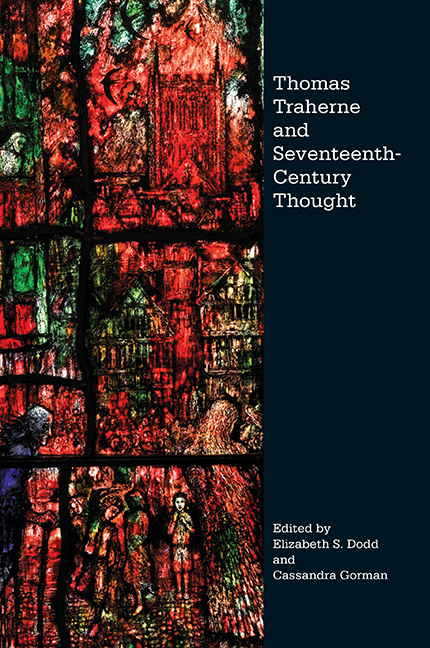Book contents
- Frontmatter
- Contents
- Contributors
- Acknowledgements
- Conventions and Abbreviations
- Foreword
- Introduction: ‘A lover of all Things … An Active ey’ (Select Meditations I.82): Traherne in Context
- PART I PHILOSOPHIES OF MATTER AND SPIRIT
- PART II PRACTICAL AND PUBLIC DEVOTION
- 5 Crossing the Red Sea: The Ceremonial Law, Typology and the Imagination
- 6 Sectarianism in The Ceremonial Law
- 7 Thomas Traherne and the Study of Happiness
- 8 ‘Innocency of Life’: The Innocence of Thomas Traherne in the Context of Seventeenth-Century Devotion
- Afterword by Jacob Blevins
- Chronology of Traherne's Life and Contemporary Intellectual Developments
- Bibliography
- Index
- Index of Biblical References
- Studies in Renaissance Literature
8 - ‘Innocency of Life’: The Innocence of Thomas Traherne in the Context of Seventeenth-Century Devotion
from PART II - PRACTICAL AND PUBLIC DEVOTION
Published online by Cambridge University Press: 05 July 2016
- Frontmatter
- Contents
- Contributors
- Acknowledgements
- Conventions and Abbreviations
- Foreword
- Introduction: ‘A lover of all Things … An Active ey’ (Select Meditations I.82): Traherne in Context
- PART I PHILOSOPHIES OF MATTER AND SPIRIT
- PART II PRACTICAL AND PUBLIC DEVOTION
- 5 Crossing the Red Sea: The Ceremonial Law, Typology and the Imagination
- 6 Sectarianism in The Ceremonial Law
- 7 Thomas Traherne and the Study of Happiness
- 8 ‘Innocency of Life’: The Innocence of Thomas Traherne in the Context of Seventeenth-Century Devotion
- Afterword by Jacob Blevins
- Chronology of Traherne's Life and Contemporary Intellectual Developments
- Bibliography
- Index
- Index of Biblical References
- Studies in Renaissance Literature
Summary
This chapter is concerned with Traherne's afterlives. It addresses an underlying yet persistent assumption in Traherne criticism: the ongoing association of Traherne's idea of innocence with a caricature of the Romantic ideal of the child. It argues that reading Traherne in the light of seventeenth-century devotion presents a very different picture of innocence; one neither derivative of, nor dependent upon, the child as its primary model. A contextual interpretation divests Traherne of the connotations that surround the Romantic picture of the child and that have been formative for Traherne criticism: the taint of nostalgia and of sentimentality, and the idealisation of the child.
My intention in this chapter is not to deny the importance of the child image in Traherne's works or his use of the child as a figure of Adamic innocence, which have been extensively described in previous literature. Rather, I seek to explore the hitherto neglected wider semantic field of his language of innocence, in light of a fresh reading of his devotional hinterland. This chapter focuses upon seventeenth-century devotional literature rather than on the entire corpus of Traherne's sources, which limits the scope of what would otherwise have been a much longer chapter. It also illustrates the importance of the devotional culture that shaped the ways in which Traherne wrote about innocence, which in its literal sense is primarily a moral and spiritual term that denotes harmlessness, guiltlessness and holiness. It outlines several forms of the contemporary devotional language of innocence that are found in Traherne's works. Its treatment is not comprehensive, but should be sufficient to indicate the importance of providing an alternative intellectual framework to the illusory genealogy that has identified Trahernian innocence as a precursor to the Romantic ideal. While concurring with previous criticism on the significance of innocence as a concept for Traherne, this paper concludes that the scriptural, ethical, sacramental and devotional models of innocence that influenced his works portray not a lost and yearned-for infant paradise, but an ‘innocency of life’ that is part of the life of faith.
- Type
- Chapter
- Information
- Thomas Traherne and Seventeenth-Century Thought , pp. 172 - 192Publisher: Boydell & BrewerPrint publication year: 2016



